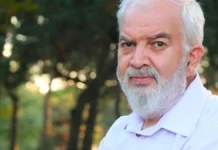Harun Kabakçıoğlu, the brother of former police inspector Mustafa Kabakçıoğlu who was found dead on a chair in a quarantine cell in prison in August 2020, said his brother died due to gross negligence and ill-treatment.
In a letter published by Bold Medya, Kabakçıoğlu said his brother was imprisoned despite being critically ill. “My brother was rarely taken to the hospital and in the instances he was, he was made to walk long distances when he could barely stand,” said Kabakçıoğlu.
Mustafa Kabakçıoğlu, 44, struggled with multiple health problems during his time in prison. Already an asthma patient, the former police officer reportedly lost 40 kilos and developed diabetes while serving a sentence at the Gümüşhane E Type Closed Prison due to the poor conditions of the facility.
He started coughing on August 20 and was put in a solitary cell on suspicion of having contracted COVID-19. He was alone for the next nine days, and it was claimed that he died in his cell after heavy coughing that continued until morning.
Kabakçıoğlu claimed the prison administration repeatedly told them his brother had rejected treatment. “This is a lie,” he said. “In his last letter, written two days before his death, my brother said he used his medication regularly but felt they had an adverse effect. He said he felt numbness, that his mouth and leg had swollen.”
A petition written by Mustafa Kabakçıoğlu to the prison doctor two days before his death was found in his cell.
Kabakçıoğlu said his brother had archived the ill-treatment and torture he experienced in prison in his diary. The diary shows he was treated poorly by prison officials and details the daily misconducts he endured.
In an entry dated February 28, 2017 Mustafa Kabakçıoğlu tells about an episode when he passed out in his cell, hitting his head on the ground. When he regained consciousness, he started vomiting.
Following the incident, emergency medical personnel were called to the prison. But he wasn’t taken to the hospital right away. Mustafa Kabakçıoğlu recollects how he was kept waiting for reasons he couldn’t understand:
“Prison guards took me and brought me to the entrance. Here the emergency medical personnel and the gendarmes had an argument, each reminding the other of their duties. I was there, waiting for them half conscious. The emergency medical personnel said the patient had to be taken to the hospital. Yet the guards kept saying they had other duties to attend to.”
He was then taken to another part of the prison in a wheelchair in a semi-conscious state. He remembers continuing to vomit there and not being able to control his bodily functions. Upon their arrival at the hospital, the gendarmes first tried to make him walk. He then started to vomit again and only then did the gendarmes realized how critical his condition was and started to act more reasonably.
After an examination by a doctor, he was told he had head trauma caused by hitting his head on the ground when he fell in his cell. He was given intravenous medication, and he recalls a gendarme trying to adjust the IV drip to make it finish more quickly.

He added that despite the fact that Ömer Faruk Gergerlioğlu, a human rights activist and deputy from the Peoples’ Democratic Party, had requested information on the investigation three times, the Ministry of Justice had not provided an answer.
Kabakçıoğlu was arrested in July 2016 and was summarily dismissed from his job in September 2016 for alleged membership in the Gülen movement. He was sentenced to seven years, six months in prison.
Turkish President Recep Tayyip Erdoğan has been targeting followers of the Gülen movement, a faith based group inspired by Muslim cleric Fethullah Gülen, since the corruption investigations of December 17-25, 2013, which implicated then-Prime Minister Erdoğan, his family members and his inner circle.
Dismissing the investigations as a Gülenist coup and conspiracy against his government, Erdoğan designated the Gülen movement as a terrorist organization and began to target its members. He intensified the crackdown on the movement following the coup attempt, that he accused Gülen of masterminding. Gülen and the movement strongly deny involvement in the abortive putsch or any terrorist activity.
Post-mortem photos of Mustafa Kabakçıoğlu revealed the unsanitary conditions in which he was forced to live.
In the photographs Kabakçıoğlu’s lifeless body is seen in a chair in a sitting position, his head drooping back and his nails turned blue. The conditions of his prison cell were also photographed, revealing damp and filthy quarters and dirt on his T-shirt.
There has been an increase in the number of suspicious deaths in Turkey, most of them occurring in prisons and detention centers, where torture and ill treatment are routinely practiced. In the majority of cases authorities classified these deaths as suicides without any effective, independent investigation. Suspicious deaths have also taken place beyond prison walls amid psychological pressure and threats of imprisonment and torture, sometimes following the release of suspects or just before their detention.
The true number of deaths during a state of emergency declared in Turkey in July 2016 is still unknown. According to SCF’s Suspicious Deaths And Suicides In Turkey list, there are over 200 recorded suspicious deaths occurring in prisons and detention centers.
















